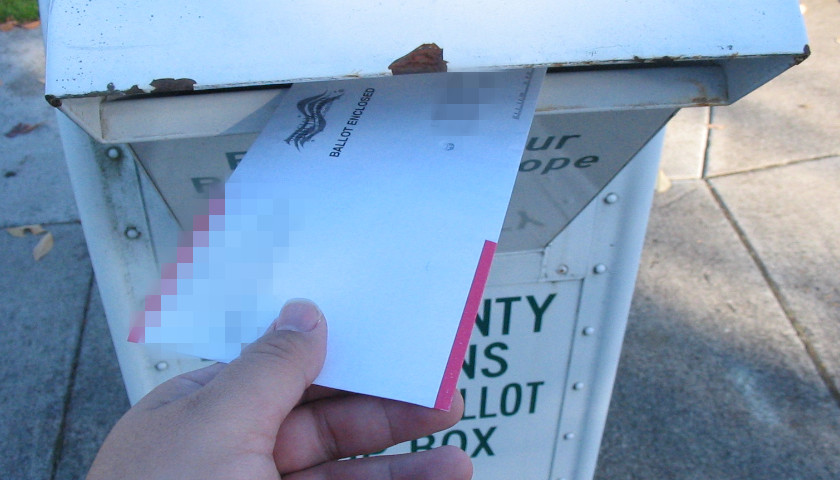by Anthony Hennen
Pennsylvania’s expansion of mail-in voting in 2019 has left some ambiguity about which ballots get counted, and state Republicans are requesting clarity from the Department of State over the matter.
While Republicans point to a recent federal ruling, the Department cites a state ruling to deny changing its current guidance.
As The Center Square previously reported, state law requires mail-in ballots to be signed and dated on the outer envelope when sent to a county board of elections. A recent Supreme Court decision to render a court case moot on procedural grounds that dealt with undated ballots, however, did not bring clarity to the issue.
The Pennsylvania Department of State has issued guidance for boards of elections to include undated ballots in their total vote counts, calling a lack of date on the ballot “irrelevant.” Mailed ballots can be verified by the postmarked date.
The ambiguity between state law and guidance from the Department of State has prompted House Majority Leader Kerry Benninghoff and Speaker Bryan Cutler to send a letter to Acting Secretary of State Leigh Chapman requesting updated guidance.
In the letter, sent Thursday, Benninghoff and Cutler request the Department “to require undated ballots be segregated following canvassing.” Canvassing is the process in which election boards verify the ballots are valid.
Republican officials have argued that the existing election code determines that undated ballots should not be considered valid.
“While we continue to believe the plain language of §3150.16 of the Pennsylvania Election Code is clear that no-excuse absentee ballots must be dated to be valid, conflicting judicial interpretations, coupled with frequently revised guidance from your department, has created ambiguity over this provision,” the letter states.
Benninghoff and Cutler want the department to update the guidance accordingly.“As it relates to undated ballots, the current guidance makes no provision for ballot segregation post-canvass,” the letter states. “Given the high likelihood of new litigation over this provision, segregating undated ballots is the only guarantee these ballots will be easily preserved.”
The department, however, does not see a need to update its guidance. The Supreme Court decision did not address a substantive issue in Pennsylvania.
“The U.S. Supreme Court did not hold that counties may disregard undated ballots, and did not change the status quo,” Department of State spokeswoman Ellen Lyon wrote in an email. “The U.S. Supreme Court merely vacated the lower court’s (3rd Circuit) ruling as ‘moot’ because that election had long-ago been decided, and there was no longer any disputed issue.”
Instead, the department emphasized a state court ruling.
“Further, the PA Commonwealth Court has ruled, in a separate case, that counties must include timely undated mail-in and absentee ballots in certifying their returns and that decision remains good law,” Lyon said. “The Pennsylvania Department of State has not changed its guidance regarding undated mail-in/absentee ballots. The department expects counties to comply with the obligation to count all legal votes.”
The department explains the mail-in ballot process on its website and specifies that “You must seal (the mailing envelope) and sign and date the declaration before you can return your ballot.”
In its guidance from Sept. 26, the Department notes that an outer envelope with a signed declaration “is sufficient, and counties should continue to precanvass and canvass these ballots.” If the outer envelope is not signed, then it “is not sufficient and must be set aside, declared void, and may not be counted.”
The guidance also clarifies that, “Any ballot-return envelope that is undated or dated with an incorrect date but that has been timely received by the county shall be included in the precanvass and canvass.”
While fewer voters have requested absentee and mail-in ballots in 2022 compared to 2020 (1.1 million versus 2.5 million, respectively), close races that get determined by mail-in ballots could spark a lawsuit — and more election headaches for Pennsylvania voters.
– – –
Anthony Hennen is a reporter for The Center Square. Previously, he worked for Philadelphia Weekly and the James G. Martin Center for Academic Renewal. He is managing editor of Expatalachians, a journalism project focused on the Appalachian region.
Photo “Absentee Ballot Drop Off” by Chris Phan. CC BY-SA 3.0.









A mail-in ballot is not necessary unless a person has an illness or serious reason where they cannot drive or take a bus or taxis cab. When a person votes they should be given 3 1/2 hours off on election day to go vote. If this was done in person voting is easily verified at the voting site. The only people who want mail-in voting are those who don’t hesitate to make sure they win. A saying made by Stalin is true: “It’s not the voters who decide an election, it’s those who count the votes.” The democrats and the old commie leader know this and use it to get elected. I really believe this false election winning when a democrat party needs to win or stay in office to keep their power and money gained as an office holder has been going on since the 50s when all of a sudden the democrats were winning at the elections and the republicans were lucky if two republicans won an office. Democrats from the 50s on starting making laws that were not appropriate for this republic, i.e. murder of babies in the womb, definition of marriage changed, socialism showing up in schools because teachers were going to colleges pushing socialism, fake laws opposite Constitution laws, special privileges passed given to LGBT that normal people don’t have, more and more govt intrusion into our lives, etc., etc, without a vote of citizens who are directly involved with living with these fake laws while those making the laws lived in higher class neighborhoods and had taxpayer protection against citizens. Took time, a few years, but I finally left the democrat party as the above and even more became more and more apparent and saw the republican party returning to it’s republic Grand Ole republican views.